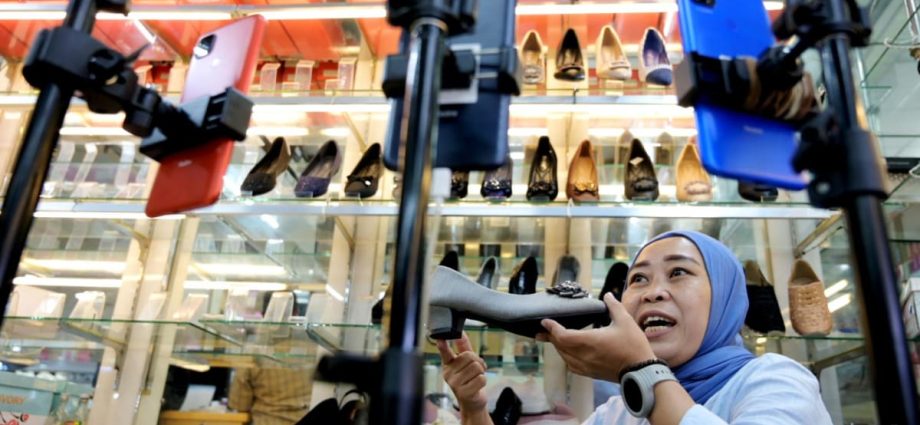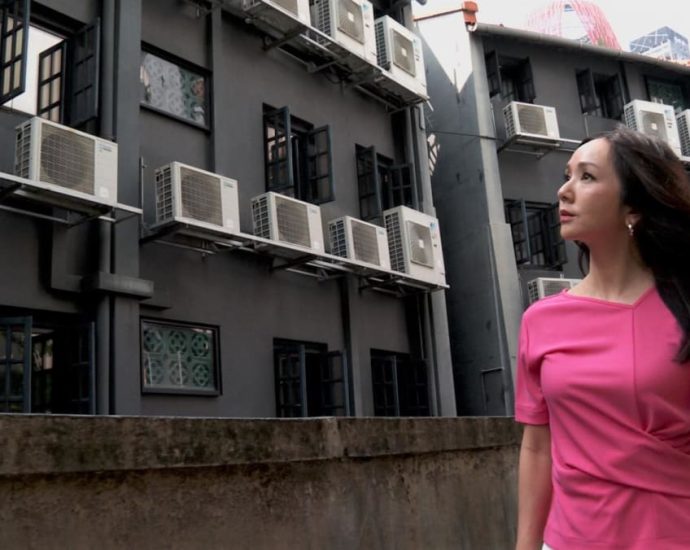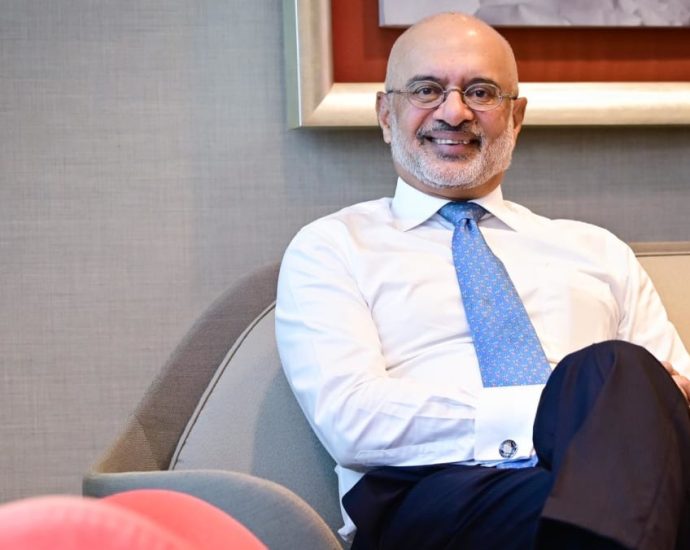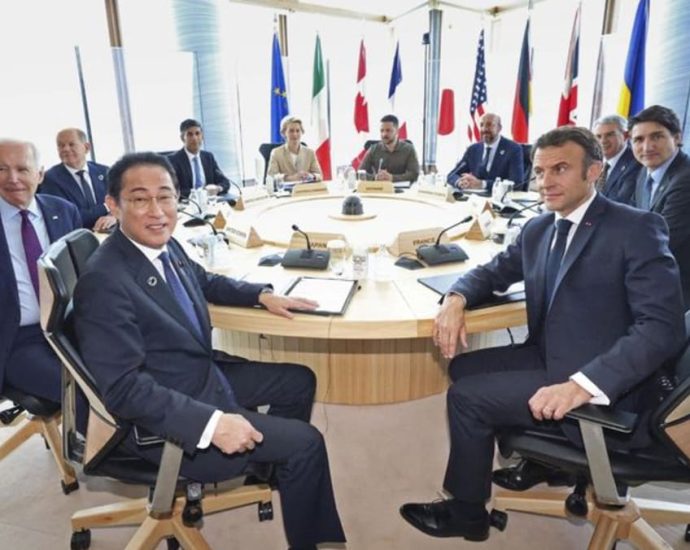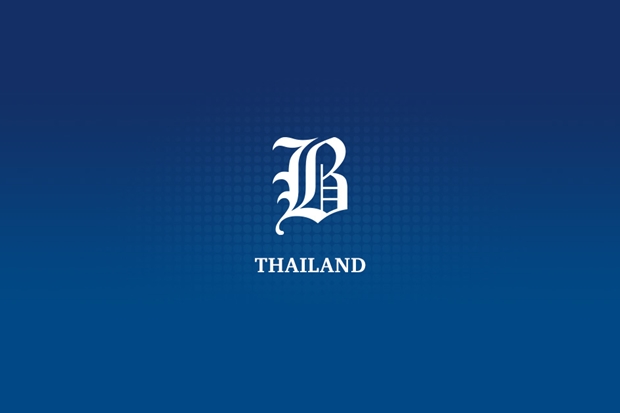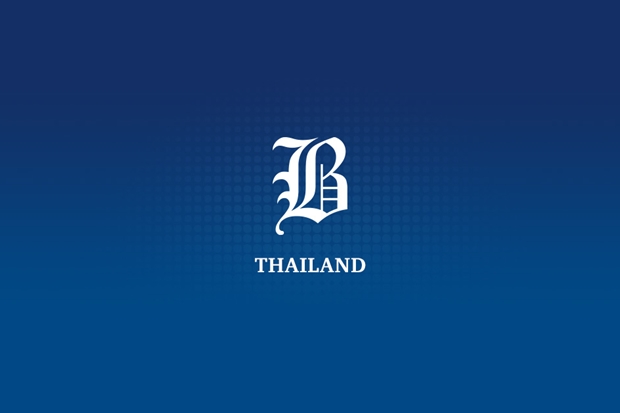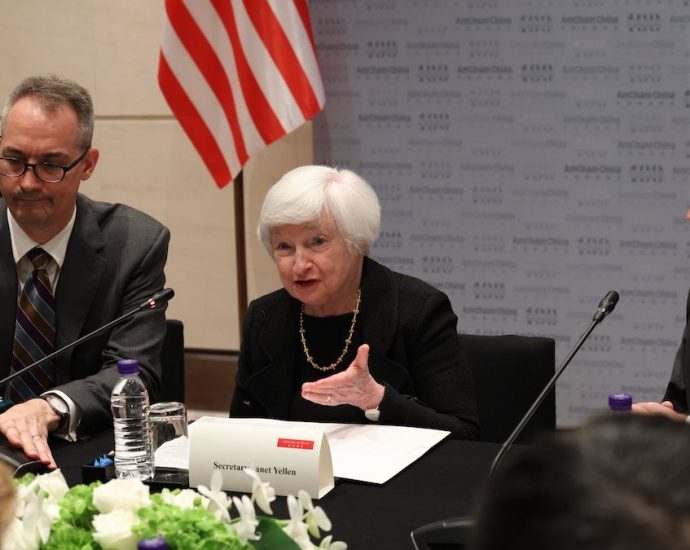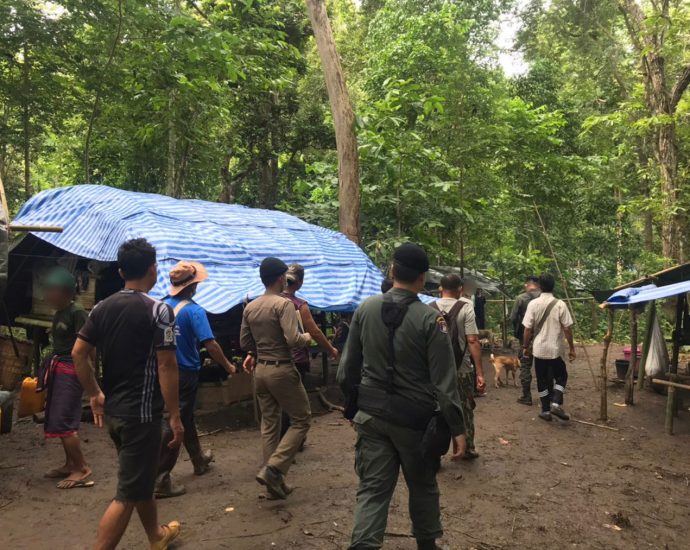Indonesia’s social commerce boom comes with an unexpected casualty – struggling shopping malls
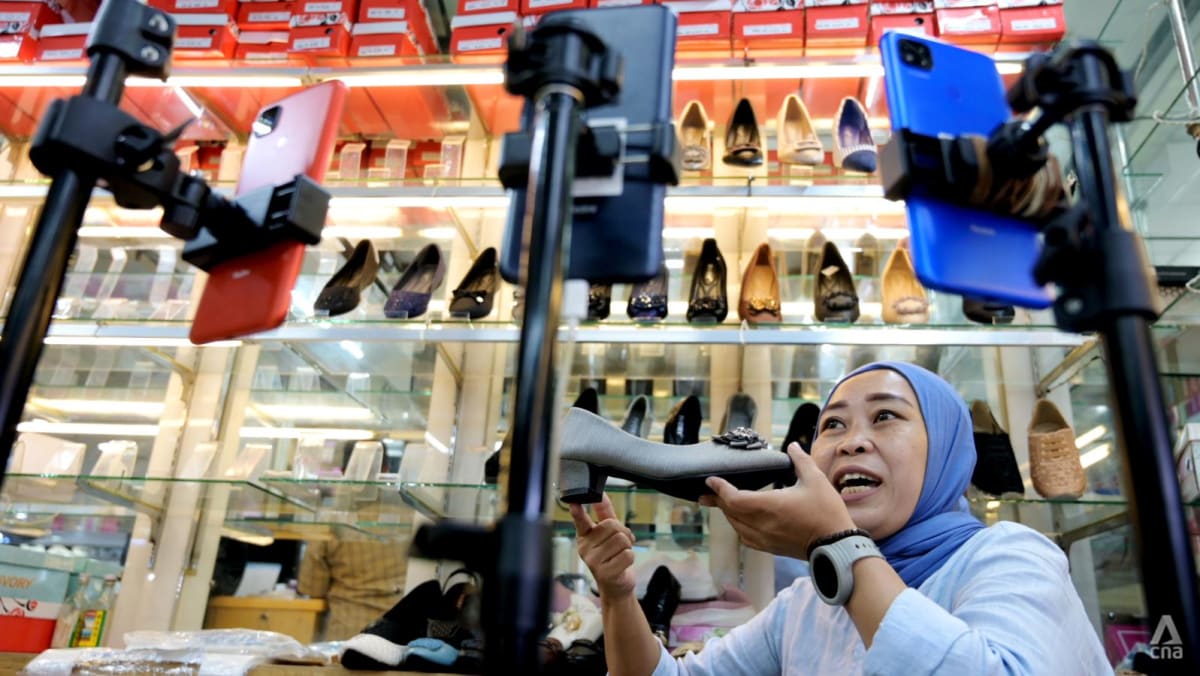
Shopkeeper Hariyanti said she and her colleagues go live for two hours everyday between 12pm and 2pm, displaying one item after another using three smartphones to capture audiences from three different platforms: TikTok Shop, Shopee and Instagram.
So far, she said, the store generates more sales from TikTok Shop compared to the other two platforms.
“Maybe (TikTok Shop) is more suited to our demographics. Maybe because (TikTok Shop) has more promos like discounts and free delivery. I don’t know for sure,” she said.
SOME SHOPPING MALLS STRUGGLE TO RECOVER
Miranti Amelia, who owns a clothing shop at a mall in West Jakarta, said although her store still welcomes physical customers from time to time, their numbers are dwindling.
“They usually saw us on social media but insisted on coming to the store to try our clothes for themselves. They buy one or two clothes and once they are confident with our products, their next purchase will be done online,” she told CNA.
“I even had one customer who came to the shop, tried our products and bought the same items at our online store while she was still at my physical shop. When I asked her why, she said: ‘There are many promos online’.”
Amelia said with offline sales dwindling, her physical store now acts more like window dressing to her online store and a backdrop for her daily livestreams.
“I plan on moving everything to a two-storey store. It’s hard to operate an online store from inside a mall. There’s not enough space for my workers to pack our shipment. Our couriers have to go up and down the stairs and elevators,” she said.
But moving away from a shopping mall is not for everyone.
Shop owner Josh Sulistyo said although his store’s online sales are starting to catch up with its offline transactions, he will continue to operate from Tanah Abang shopping complex, which has a reputation for being a magnet for wholesalers from across Indonesia.
“We need this shop to show (wholesalers) that we mean business, give them extra confidence that we have ample stock and we can deliver no matter the size of their order,” he said.
What impact can 3 degrees have? The right air-con setting may boost productivity, and more

That was not the only result. “It was really interesting, physiologically,” said experimenter and SUSS associate professor Emily Ortega. “With skin temperature, it was quite clear that it kept going down in the slightly warmer condition.”
The convergence of lower skin temperatures and faster reaction times points to 25 deg C as more conducive to working, even though many of the participants, before the experiment, thought the colder the room, the higher their productivity.
“Now we have some kind of evidence to suggest that what you think isn’t what you get,” said experimenter Ooi Seok Hui.
The National Environment Agency advises setting the air-con at 25 deg C as an energy-saving tip. And there is also research behind this.
Air-conditioning and Refrigeration Association president Leong Cheng Wee, citing the famed thermal engineer Povl Ole Fanger, said comfortable temperatures can range between 22 and 27 deg C.
WATCH: What is the best temperature to set my air conditioner? (22:25)
Commentary: Why is hard-selling prepaid packages so common across Singapore beauty salons?

SINGAPORE: The beauty service industry in Singapore unfortunately has a poor reputation because of a few bad actors. The latest of these is beauty salon chain Salon One, which was accused of engaging in pressure sales tactics at some of its outlets. The salon also received a warning for making false health claims over its treatment.
Singapore’s consumer watchdog, the Consumers Association of Singapore (CASE), received more than 1,400 complaints against the beauty industry in 2022, accounting for about 10 per cent of all the complaints it received.
Prepaid packages often feature in pressure sales tactics across beauty service providers. You’ve probably heard the horror stories or even experienced them yourself: A salesperson places the customer in a closed room and points out all their physical flaws, then offers a limited-time special promotion for treatments to address them.
A friend who went through this described the experience as unpleasant and suffocating. She felt trapped in the room until she agreed to buy more sessions. She ultimately gave in and purchased the smallest package.
Despite finding the treatment satisfactory, she never returned because the experience left a negative impression, and did not want to go through it again when her package ended. She would rather waste the money that she had spent.
The beauty salon lost a potential long-term customer and gained a negative reputation among my friend’s social circle. So why are hard-selling prepaid packages still a common practice in the industry?
PREPAID PACKAGES PROTECT SALONS
From a business perspective, prepaid packages protect the salons that sell them. Running a beauty salon requires significant capital, including rental, staffing, as well as purchase and maintenance of equipment.
Nonthaburi bridge ‘not a safety risk’

The ground columns of Phra Nang Klao Bridge were designed in line with international engineering standards, one of the main project crew said on Friday in response to speculation they may be too thin to properly support the structure.
On Thursday, a Japanese tourist tweeted a photo of the bridge in Nonthaburi province, claiming the columns were too thin. The photo was retweeted more than 8,000 times and seen by 13 million viewers, sparking an online debate about Thailand’s construction safety.
Most of the comments expressed concern about the safety of the pillars in the event of an earthquake.
On Friday, Patthanapong Thongsuk, one of the engineers who oversaw the construction project, reassured reporters they are safe and solid.
He said the bridge was designed according to the standards laid down by both Thailand’s Department of Highways and the American Association of State Highway and Transportation Officials (AASHTO), an international leader in setting technical standards for all phases of highway system development.
The base of each pillar is around 80 centimetres thick and 410cm wide. The height varies from 10-15 metres. The bridge itself contains space on the joints which helps allow the elevated road to adjust to temperature changes that can cause the bridge to contract and expand, Mr Patthanapong said.
He said thin ground columns are more flexible when it comes to supporting these changes in the bridge due to thermal effects. In contrast, large columns must bear a tremendous weight due to their rigidity.
Chavalert Lertchavanakul, a senior engineer at the Department of Highways, told the Jor Sor 100 traffic radio station that the bridge and its ground columns are safe to carry the weight of vehicles and are also quake-proof.
He noted that the ground column design has been in use since 2015. The Norwegian civil engineering company Norconsult Aasjakobsen proposed the bridge’s design to the Department of Highways, and it has since been applied to other bridges in Thailand as well, he added.
Mr Chavalert said the Phra Nang Klao Bridge has been in use for years without incident.
Anek Siripanichgorn, an adviser to the Engineering Institute of Thailand under HM the King’s patronage, explained that the thin ground columns are a new design and are safer than thicker columns if there is an earthquake.
A similar design is applied to a lot of Japanese infrastructure, he said.
DBS CEO Piyush Gupta on blame culture and âair coverâ when things go wrong
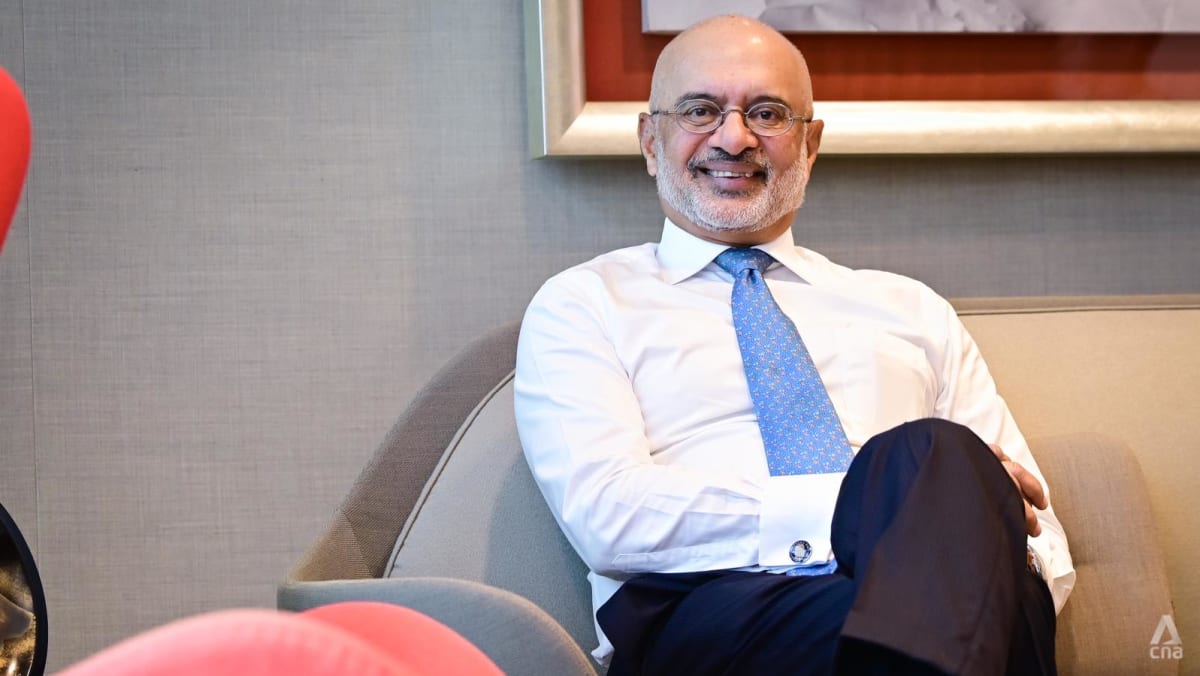
The second big part is this: Received wisdom then and even now has always been that it’s very hard for old companies to change, it’s very hard for old people to change. And it’s something that I’ve never believed … look (at) those in their 40s and 50s and 60s. We’re all changing in our personal lives.
When people have changed in their personal lives, why do we think they can’t change in a company? I have this big belief that the problem is not with human beings; the problem is with the company.”
ON HOW FAILURE CHANGED HIM
Gupta: When you’ve seen the bottom of the barrel, which is what I thought I was seeing (when his own business went bust during the dotcom crash), it changes your outlook. It changed my appetite for risk. At the end of the day, the change is so rapid and change is accelerating … without making some bets, without taking some moonshots, or taking some risks, you’re not going to succeed.
In my 20s and 30s, building a career was probably my single biggest driver. How do I make sure that I can get ahead, I get promoted, I get a bigger job, I become the youngest managing director?
Commentary: A year after Abeâs death, Japan is more geopolitically relevant than ever
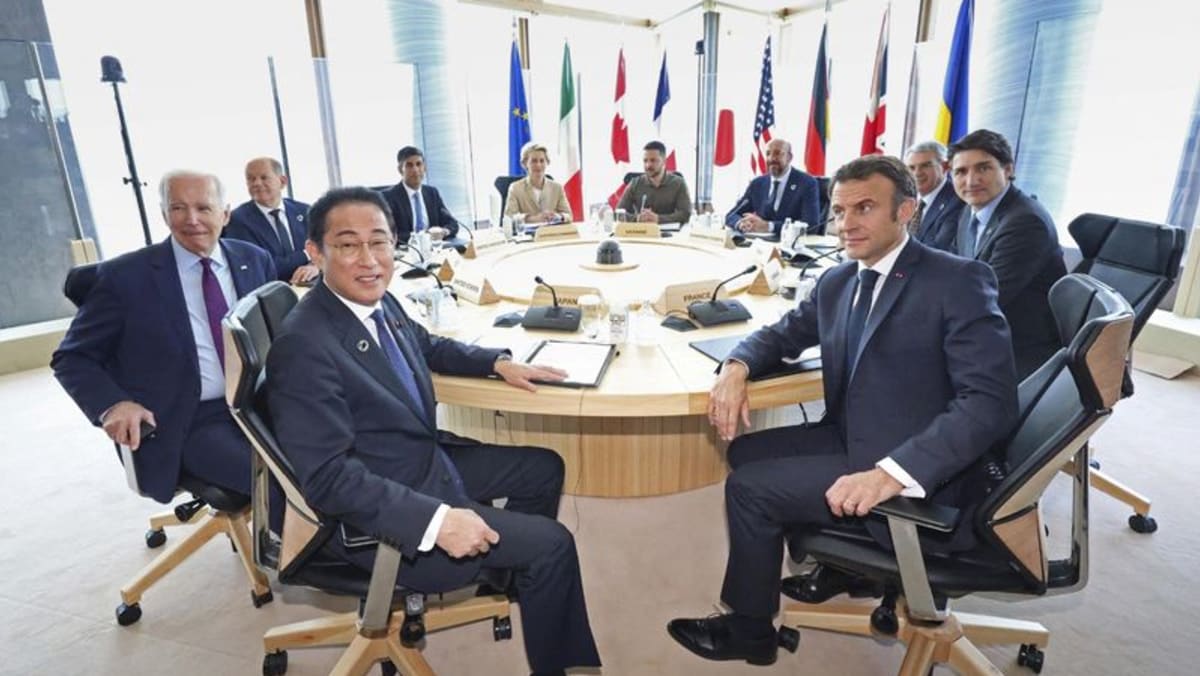
TOKYO: It would be easy to assume that not much has changed since Shinzo Abe, Japan’s longest-serving prime minister and de facto senior statesman, was assassinated in broad daylight one year ago.
But there’s an evolution underway, and Japan is moving closer to the nation Abe aspired to when he was gunned down on the campaign trail for upper house elections on Jul 8, 2022. The language of decline, of a country whose time has passed, is gone: From think tanks to hedge funds, Japan is on everyone’s lips. Tokyo is at the heart of Washington’s strategy to “de-risk” from China.
Money is flowing into the markets, led by Warren Buffett. And tourists are flocking back, with more Americans coming now than before the pandemic.
Abe aimed to build a Japan that could cast off the shackles of its wartime guilt and assume a position on the geopolitical stage befitting its economic might.
The former prime minister laid out not just how his nation should position itself against China, but created the model that now dominates Western thinking toward Beijing. He spearheaded the concept of the “free and open Indo-Pacific,” later adopted by the United States, outlining this coalition of like-minded nations as far back as 2007.
The current prime minister, Fumio Kishida, has taken that ball and is running with it, with his plan to radically overhaul Japan’s military spending, a move that has vociferous US support. The country is taking steps to shore up its weakened defense industry and is looking to relax a long-standing ban on the export of weapons in a bid to add additional support for Ukraine.
Malaysia eyes secondary locations to attract Thais

The Malaysia Tourism Promotion Board, also known as Tourism Malaysia, will promote secondary tourist destinations in the neighbouring country to attract Thai travellers.
Thanapat Tiyanont, Marketing Officer of Tourism Malaysia Bangkok Office, told the Bangkok Post that the top four Malaysian destinations among Thai travellers are Kuala Lumpur, Penang, Pahang and Malacca.
To promote secondary destinations, the agency will cooperate with related agencies to promote Kuching, known for its natural beauty; Mount Kinabalu on Borneo island; and Perak state, which borders Thailand’s Yala province, he said.
Perak is famous for its food, limestone caves and mountains, he said.
He said that during the first four months of the year, Malaysia welcomed about 500,000 Thais, adding its target of attracting 1 million Thai tourists before the end of the year will be achievable.
Mr Thanapat also said that there will be more direct flights connecting both countries.
At the end of last month, Malaysia’s MYAirline established direct flights from the capital Kuala Lumpur to Bangkok.
“Bangkok was chosen as MYAirline’s first international destination due to the increasing numbers of both business and leisure travellers to and from Malaysia,” CEO Rayner Teo Kheng Hock said.
According to a record of the Tourism and Sports Ministry, Thailand welcomed 1,696,358 Malaysian visitors from January to May, up from 76,420 visitors during the same period last year.
“We are confident that this trend will continue as trade and tourism between Malaysia and Thailand will further develop in the coming years,” Mr Rayner added.
Founded in January 2021, the airline offered its first domestic flights from Kuala Lumpur to Kuching, Kota Kinabalu and Langkawi in December last year. The service was later expanded to nine domestic destinations.
Police probe marriage scam claims

Women ‘tricked into Chinese wedlock’
UDON THANI: Provincial police are looking into whether the case of a woman who allegedly fell for a Chinese marriage scam should be considered as a human trafficking case.
Pol Maj Gen Pitsanu Unhaseree, commander of Udon Thani Provincial Police, on Friday said an officer was assigned to initially investigate claims that a 31-year-old woman, identified as Nuch, and three others were tricked into marrying Chinese men.
They were said to be persuaded by a matchmaker, identified as Da, to marry Chinese men for 100,000-baht dowries with a condition to become pregnant in the first six months.
However, the victims were said to have stayed in China as servants or even their father-in-laws’ second wives after the babies were delivered.
Nuch, who is from the province’s Nong Wua So district, first told the media on Thursday about the marriage scam. She said she and three other Thai women were able to leave China and arrive in Thailand last month due to her mother’s help.
She said she decided to tell her story because she wanted her case to be a lesson for other Thai women. Nuch said she married 32-year-old Chinese national Jin Wei Lian less than three days after their matchmaking before moving to China’s Hubei province.
She said she told the matchmaker before meeting her husband that she was unable to bear children, but the marriage went ahead regardless. She said she was kept in a house and was assaulted by her husband and her mother-in-law for not becoming pregnant.
She said she was assaulted for three years before she decided to flee to Thailand along with three other victims of the scam.
Pol Maj Gen Pitsanu said the case cannot yet be considered a human trafficking case yet as the marriage registration and contract were legally done.
“Investigators are now in the process of gathering more evidence and questioning all the victims and the matchmaker,” he said.
Pol Col Suraphong Charttisut, deputy commander of the Anti-Trafficking in Persons Division, said both parties consented while the contract was made, therefore the case may not be classified as human trafficking.
The matchmaker’s actions may also not be considered human trafficking, he said, adding more details will need to be investigated.
Cordial tone in Yellenâs Beijing visit
China has called on the United States to take concrete actions to create a favorable environment for both sides to achieve mutual benefit.
Beijing hopes US Treasury Secretary Janet Yellen, a dovish American official who began a four-day trip to China on Thursday, will take home to President Joe Biden a message: There will be no winners in trade wars and an economic “decoupling.”
Following China’s unveiling earlier this week of export controls of gallium and germanium, raw materials of semiconductors, Yellen met with Chinese Premier Li Qiang at the Great Hall of the People in Beijing on Friday.
She told Li that the US seeks to have healthy economic competition, instead of a “winner-take-all” fight, with China, to benefit both countries over time. She also said that in certain circumstances the US would need to pursue targeted actions to protect its national security.
Yellen is the second high-ranking US official to visit China after US Secretary of State Antony Blinken met with Chinese President Xi Jinping in Beijing on June 19.
These talks were held against the backdrop of an intensifying chip war in which Japan and the Netherlands will restrict the exports of their chip-making raw materials and equipment to China on July 23 and September 1, respectively.
Media reports said last week that Washington will soon announce its plan to ban Nvidia from shipping its A800 and H800 artificial intelligence chips to China, and also restrict US funds from investing in China’s high-technology sectors later this month. To retaliate, China said Monday that it will require companies to apply for licenses to export gallium and germanium from August 1.
‘Seeing rainbow’
When Yellen arrived in Beijing on Thursday, she tweeted that she was going to “seek a healthy economic competition that benefits American workers and firms and to collaborate on global challenges.”
“We will take action to protect our national security when needed, and this trip presents an opportunity to communicate and avoid miscommunication or misunderstanding,” she said in the tweet.
Chinese officials and state media have so far used a more friendly tone to describe Yellen’s China trip than they did with Blinken’s.
“I am very happy to meet you in Beijing,” Li told Yellen at the beginning of their meeting on Friday. “Not only China and the United States, but also people in the whole world, are paying close attention to your visit to Beijing.”
“Yesterday, the moment you arrived at our airport and left the plane, we saw a rainbow,” he said. “I think it can apply to the US-China relationship too: after experiencing a round of winds and rains, we surely can see a rainbow.”
“I also often say to Chinese entrepreneurs that we always have to go through a difficult time,” he said. “When we say it’s bad this year, it can be worse next year. We must survive.”
He said Chinese enterprises must observe the world economy and look forward and cannot just look at the water under their feet on rainy days. He said this practice can also be applied in Sino-US relations.
Before a meeting with Li, Yellen had a “substantive conversation” with former Chinese Vice Premier Liu He and the outgoing governor of China’s central bank, Yi Gang, AFP reported. They discussed the global economic outlook and the respective economic outlooks for the US and China.

Equal relationship
On Friday, China’s Ministry of Finance said in a statement that Yellen’s visit to China is a concrete measure to implement the important consensus of last November’s Xi-Biden meeting. It said the trip will strengthen communication and exchanges in the financial area between the two countries.
“The essence of Sino-US economic relations is to achieve mutual benefit and win-win results. There will be no winners in trade wars and ‘decoupling’,” said an unnamed spokesperson of the Finance Ministry. “We hope that the US will take concrete actions to create a favorable environment for the healthy development of economic and trade relations between the two countries.”
Su Xiaohui, deputy director of the Department of American Studies at China Institute of International Studies, remarks in a video released on Friday that Yellen’s China trip was decided by both the US and China, was not a result of an invitation from China, meaning that Beijing is not asking the US for help in anything.
Su says the fact that Yellen will stay longer in China than Blinken means that both the US and China want to discuss matters in detail.
She says Beijing is willing to receive American officials as it feels that Washington has been aware that suppressing and containing China will have a negative impact on the US. She says Washington knows clearly that American firms want to see stable Sino-US relations.
“From China’s perspective, Yellen’s trip does not mean that the US can make demands on China, or that it can unilaterally pressure China and force it to compromise,” she says. “Her trip should emphasize that the development of the relationship between the two countries must be equal and mutually beneficial.”
She says Beijing’s statement of “no winners in trade wars” may touch Yellen, who had once questioned the Trump administration’s tariffs placed on Chinese imports. She says the United States’s so-called “de-risking” or “decoupling” from China does not fulfil the spirit of achieving mutual benefit and win-win results.
Diversification
In May, G7 leaders met in Japan and agreed that their members should “de-risk” from China. Beijing said there is no difference between “de-risking” and “de-coupling” as both will lead to the departure of foreign firms from China.
Yellen preferred to describe the United States’s strategy as “diversification.”
She told representatives of some China-based US firms in a Friday meeting that a decoupling of the US and Chinese economies would be “virtually impossible.”
“We seek to diversify, not to decouple. A decoupling of the world’s two largest economies would be destabilising for the global economy,” she said, adding that Washington was not seeking a “wholesale separation of our economies.”
Yellen said the US government is concerned by Beijing’s export controls on metals key to semiconductor manufacturing and is still evaluating the impact of these actions. She said the Chinese curbs reminded the US of the importance of building resilient and diversified supply chains.
“I also discussed concerns about barriers to market access, China’s use of non-market tools, and punitive actions against US firms,” she tweeted.
Luo Fuqiang, a military commentator, says in his latest vlog that he remains unconvinced that Washington will consider China’s interests and stop its suppression against China.
But he says US officials, who visit China, will continue to be received by higher-ranking Chinese officials as Beijing wants them to help send authoritative messages back to the US.
Some commentators say Beijing does not have high expectations for the outcome of Yellen’s trip as the US-China conflicts are related to the US Commerce Department and the Office of the United States Trade Representative, not the Treasury Department.
Read: China squeezes key metal supplies in chip war escalation
Follow Jeff Pao on Twitter at @jeffpao3
War refugees flood camps by border
Mae Hong Son caring for more than 5,000 people as fighting intensifies

More than 5,000 refugees from Myanmar are now taking shelter at refugee camps in Mae Sariang district of Mae Hong Son to escape fighting between the Karenni Army (KA) and Myanmar junta forces.
Reports on Thursday said the KA had been hit by junta airstrikes in a border town opposite the province in northern Thailand. Casualties and deaths were reported.
Many local residents reportedly had to carry injured people across the border to receive medical treatment in Thailand while others had to flee for border forests.
A source from the KA said the Myanmar junta carried out 19 airstrikes, seriously injuring KA soldiers. At least seven Karenni troops were reportedly sent to Mae Hong Son Hospital.
On Friday, residents in Muang district of Mae Hong Son heard gunfire from the other side of the border. It was reported the junta forces were firing shots every seven minutes.
The number of Myanmar refugees fleeing to Mae Hong Son has reached 5,156 over the past few weeks. They are staying in four shelters where humanitarian aid is provided.
Chettha Mosikrat, the Mae Hong Son governor, said the number of refugees had not yet exceeded the capacity to provide temporary help. However, officials must document every arrival as well as initiate disease prevention during the rainy season.
Surachet Puinoi, the Mae Sariang district chief, said 30 refugees at the shelters in Sao Hin and Mae Khong sub-districts had malaria. Others have developed respiratory, gastrointestinal, muscle and bone diseases.
Mr Surachet said Thai officials have sprayed mosquito repellent in the shelters every week to prevent malaria.
The Mae Sariang district public health office has provided medical officers and ambulances in the event of an emergency.
There are also two field hospitals available, he said.

